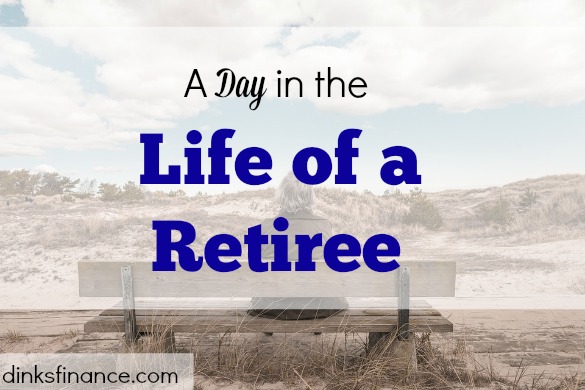 Good Morning DINKS! It’s time for the next post in our A Day in the Life Series. We have already experienced a Day in the Life of an Intern, a Job Seeker, and a Banker
Good Morning DINKS! It’s time for the next post in our A Day in the Life Series. We have already experienced a Day in the Life of an Intern, a Job Seeker, and a Banker
This is a Day in the Life of a Retiree
Jason, our Retiree, retired one year ago in July 2010 at 55 years old and 35 years of service with the same company. Nowadays it may be less common for us to start a job in our twenties and build our career with the same company until retirement. However, it was definitely not uncommon in the 70s and 80s.
Each company has a pension formula which determines the date on which its employees can retire. Jason’s former employer allowed employees to retire with full pension benefits if their current age plus the number of years of service equalled 90. At my bank the magic retirement number is also 90, there is also an option for early retirement with a reduced pension benefit starting at age 55.
Jason has been retired since last July and he has been living off of his employer’s pension for the last year. Even as a young employee Jason always contributed into his employee pension plan. Over his 35 years of service Jason contributed the maximum 4% of his annual salary into the pension plan and the company contributed 6% on his behalf. If an employee chose not to contribute the maximum 4% of their salary into the pension plan the company would only match 50% of their contributions. Therefore, if an employee elected to contribute only 2% of their annual salary into the pension plan the company would only contribute 1%. Participation in an employer pension plan is mandatory by many companies; this ensures that employees have some type of savings for their retirement.
Jason was always advised to save for retirement. Because of this advice Jason also invested his other personal savings, such as his employee stock purchase plan, into retirement saving plans. This would have been a good savings strategy if Jason was single. However, he was married with kids and therefore in case of an emergency Jason was forced to withdraw money from his retirement savings. Now as he looks back on his former retirement savings strategies he wishes that he would have also saved money in a non registered investment account.
Jason decided to retire at 55 not because it was part of his retirement plan, just because he was eligible to retire. He doesn’t have any plans for his retirement; he just plans not to work. Jason has yet to start using his personal retirement savings for his personal retirement income. He is happily living off of his employer pension benefit which is approximately $3000 per month (net) after tax. For this reason Jason emphasizes the importance of contributing into an employer pension plan, if the option is available. Even if we have no other personal retirement savings, at least we have our employer pension plan.
Jason is not one of the baby boomers who are fortunate enough to retire mortgage free. This is also one of his financial regrets. Jason wishes that he would have planned better to pay off his mortgage in full by retirement, however with changing homes and refinancing the mortgage this just wasn’t possible. Jason is currently contemplating selling his home and moving into a smaller apartment where he would pay monthly rent.
Jason’s employer benefits such as medical and dental benefits continue until he reaches the age of 65, when the Government benefits start. Jason also had the option to convert his group life insurance policy into a personal insurance policy. He declined to make the change because Jason no longer feels the need to protect his assets (formerly his children and his home) in the event of his death.
The mentality of a Retiree is not accumulation of wealth. As younger employees we always want to know how much we are saving, and we want to watch our savings grow. Jason just wants to make sure there is enough money in his accounts to live comfortably every month; he wants a fixed income stream. Jason does not save any of his monthly income, he spends every dollar right down to the last cent; Jason admits that this is a money mentality that he was not used to. He says it is liberating not to have to care about money; he spends what he has and then he waits for his next pension payment to arrive.
Living on a fixed income has been an adjustment in Jason’s money mentality. There is no longer the possibility of a supplementary income in the form of an annual bonus or the option to work overtime; this was a shock during Jason’s first year of retirement. However, he has learned to adjust. Jason admits that retirement has been an adjustment in both his lifestyle as well as his money mentality, but he says it is a change worth getting used to.
—————-
Here are the other posts in our A Day in the Life series:
Photo by Jo Bourne



Oh how I wish more people would read this article. I watch my father struggle everyday with his measly retirement check. Hope this article reaches many readers.
Reading this post made me think about something I don’t often think about. If Jason had tax sheltered retirement plans, he would not be able to tap them without paying penalties for early withdrawal. He isn’t 59 1/2. That’s one of the unforseen hazards of early retirement!
Why doesn’t he take a job, even part time, to supplement his pension check? Or is he just happy living within the means it provides?
Pingback:Preparing For A Dual Retirement | Redeeming Riches
Pingback:Planning for our retirement is easier if we know what to expect | DINKS Finance